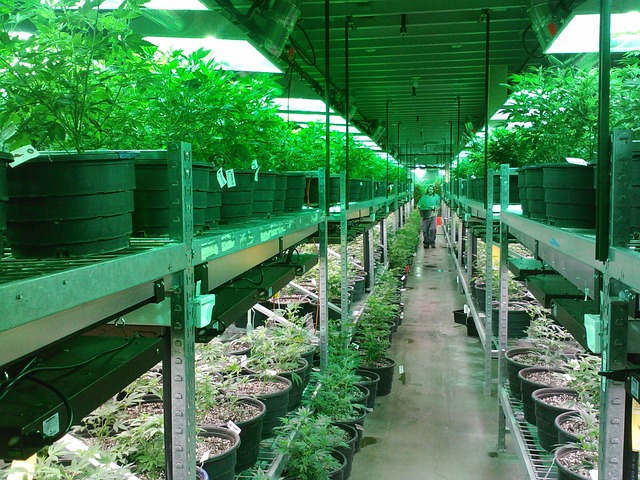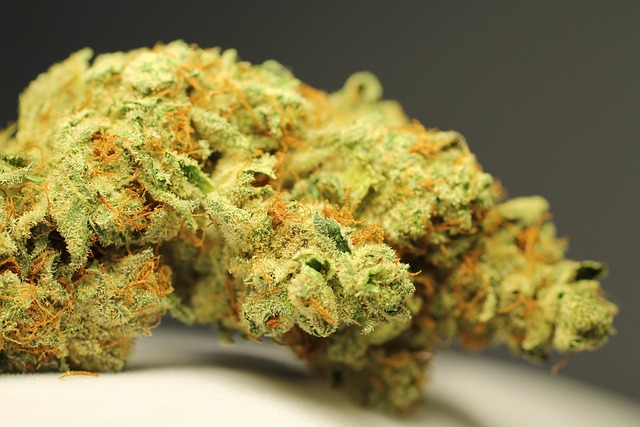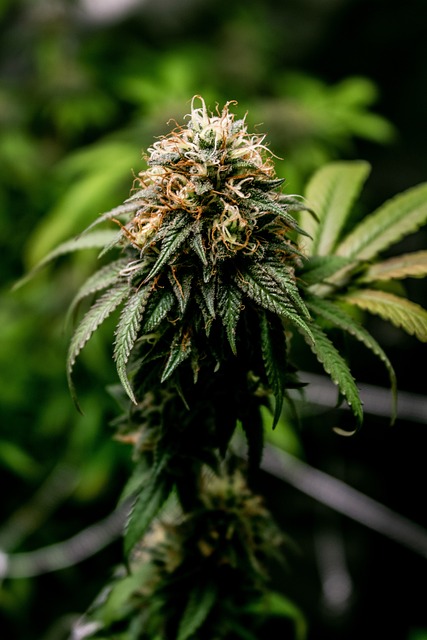The THCA flower, derived from cannabis plants and rich in the non-psychoactive compound THCA, has been studied for its potential to alleviate nausea, particularly in individuals undergoing chemotherapy. Research indicates that THCA interacts with the endocannabinoid system's CB1 and CB2 receptors, which may help regulate nausea and vomiting, stimulate appetite, and reduce inflammation. Clinical studies have shown that THCA flower can effectively mitigate nausea symptoms, offering a natural alternative to traditional anti-nausea medications. The compound betacaryophyllene oxide (BCO), also found in THCA flower, has been identified for its role in alleviating nausea through its interaction with the CB2 receptor, which affects inflammation and gastrointestinal function. Preclinical studies support BCO's effectiveness in managing nausea related to gastrointestinal disorders. The therapeutic potential of THCA flower for anti-nausea effects is promising, but more human clinical trials are needed to fully understand its benefits and optimal usage. Users are advised to consult healthcare providers before incorporating THCA flower into their health regimen, considering the need for personalized dosage and the current stage of research. The anti-nausea effects of THCA flower continue to be an area of growing interest and could represent a significant therapeutic option for managing nausea without psychoactive side effects.
Explore the emerging potential of THCA flower as a natural remedy for nausea. This article delves into the therapeutic properties of this cannabinoid-rich botanical, revealing its anti-nausea effects and how it can be seamlessly integrated into your wellness practices. From scientific research supporting its benefits to practical advice on incorporating THCA flower into your routine, discover a holistic approach to managing nausea without the psychoactive effects of traditional cannabis. Join us as we unravel the science behind this promising natural solution and enhance your understanding of its health-promoting capabilities.
- Unveiling the Anti-Nausea Properties of THCA Flower: A Deep Dive into Cannabinoid Benefits
- The Science Behind THCA Flower and Its Role in Combating Nausea
- Analyzing the Therapeutic Potential of Raw Cannabis: Insights on THCA's Anti-Nausea Effects
- Integrating THCA Flower into Your Wellness Routine for Nausea Relief
Unveiling the Anti-Nausea Properties of THCA Flower: A Deep Dive into Cannabinoid Benefits

THC acid (THCA), the raw and non-psychoactive form of tetrahydrocannabinol (THC), found in cannabis plants, has garnered attention for its potential health benefits, particularly its anti-nausea effects. Research indicates that THCA interacts with the body’s endocannabinoid system, which plays a crucial role in regulating various physiological processes, including nausea and vomiting. Studies have shown that THCA flower can be beneficial in alleviating symptoms of nausea, making it a valuable option for individuals undergoing treatments like chemotherapy that often lead to these debilitating side effects. The anti-nausea properties of THCA are believed to stem from its ability to stimulate appetite and reduce inflammation, which can contribute to the overall well-being of patients experiencing nausea.
Furthermore, the cannabinoid THCA is known for its biphasic nature, meaning that it can have different effects at varying dosages. At lower concentrations, THCA may provide a calming effect, which can further aid in reducing stress and anxiety often associated with nausea. In contrast, higher doses of THCA may offer more pronounced anti-emetic (anti-nausea) effects due to its interaction with the CB1 receptors in the brain, known to play a significant role in regulating vomiting and nausea. The potential of THCA flower as an anti-nausea agent is an area of ongoing research, promising a natural alternative for those seeking relief from nausea without the psychoactive effects associated with other cannabinoids like THC.
The Science Behind THCA Flower and Its Role in Combating Nausea

Betacaryophyllene oxide (BCO), a prominent cannabinoid found in THCA flower, exhibits a unique interaction with the body’s receptors, which is thought to contribute to its anti-nausea effects. This compound binds to the CB2 receptor, which plays a significant role in regulating inflammation and gastrointestinal motility, both of which are implicated in nausea and vomiting, particularly those associated with gastrointestinal disorders. Preclinical studies have demonstrated that BCO can alleviate symptoms of nausea by modulating these physiological responses. Additionally, THCA flower contains tetrahydrocannabinolic acid (THCa), which is non-psychoactive and has been studied for its potential anti-emetic properties. THCa interacts with the endocannabinoid system’s receptors in a way that may help to reduce nausea, as indicated by animal research. The precise mechanisms are still under investigation, but these findings suggest that THCa flower could be a promising alternative therapy for individuals suffering from chemotherapy-induced and other types of nausea. As research progresses, the potential therapeutic benefits of THCA flower in combating nausea continue to emerge, offering hope for those seeking effective, non-psychoactive treatment options.
Analyzing the Therapeutic Potential of Raw Cannabis: Insights on THCA's Anti-Nausea Effects

The therapeutic potential of raw cannabis, particularly its non-psychoactive acidic form, THCA (Tetrahydrocannabinolic Acid), has garnered significant attention within the medical community, especially in relation to its anti-nausea effects. THCA is the precursor to THC (Tetrahydrocannabinol) and exists naturally in raw cannabis flowers. It is recognized for its potential role in alleviating symptoms of nausea and stimulating appetite without the psychoactive side effects associated with its decarboxylated counterpart, THC. Studies have shown that THCA interacts with the body’s endocannabinoid system through its affinity for both CB1 and CB2 receptors, which may contribute to its anti-emetic properties. Patients undergoing treatments like chemotherapy often experience nausea as a side effect, and THCA flower has been explored as a potential natural remedy due to its efficacy in animal models. The raw cannabis approach allows for the utilization of THCA’s therapeutic benefits while avoiding the psychoactive effects typically elicited by heat-activated THC, offering a versatile and targeted solution for those seeking nausea relief without mind-altering consequences. As research continues to unfold, the application of THCA from raw cannabis flowers is becoming an area of considerable interest for addressing various health concerns, with its anti-nausea effects being one of the most promising avenues of exploration.
Integrating THCA Flower into Your Wellness Routine for Nausea Relief

Incorporating THCA flower, which is rich in tetrahydrocannabinolic acid (THCA), into your wellness routine may offer significant anti-nausea effects. THCA, the raw form of THC found in hemp and cannabis plants, has been studied for its potential to alleviate nausea. Unlike its psychoactive counterpart, THC, THCA does not produce a high but interacts with the body’s endocannabinoid system, which regulates various functions including appetite, digestion, and immune response. Users reporting relief from nausea have attributed this to the anti-emetic properties of THCA flower, suggesting its potential as a natural remedy for those experiencing nausea due to chemotherapy, gastrointestinal disorders, or other medical conditions.
For individuals seeking an alternative to traditional pharmaceuticals for nausea management, THCA flower may be a beneficial addition to their wellness regimen. It’s important to note that while anecdotal evidence and research on animals are promising, further human clinical trials are necessary to fully understand the efficacy of THCA flower for anti-nausea effects. Those considering adding THCA flower to their routine should consult with a healthcare provider to ensure it complements their overall health plan and to determine the appropriate dosage based on their specific needs and conditions.
The exploration of THCA flower’s anti-nausea effects presents a compelling case for its therapeutic potential. The scientific evidence underscores the benefits of incorporating THCA flower into one’s wellness routine, offering a natural approach to managing nausea. As a promising addition to the arsenal of remedies against this debilitating condition, THCA flower stands out as a noteworthy option for those seeking alternatives outside the conventional pharmacopoeia. With further research, the scope of its applications may be expanded, potentially offering relief to a broader spectrum of individuals.
